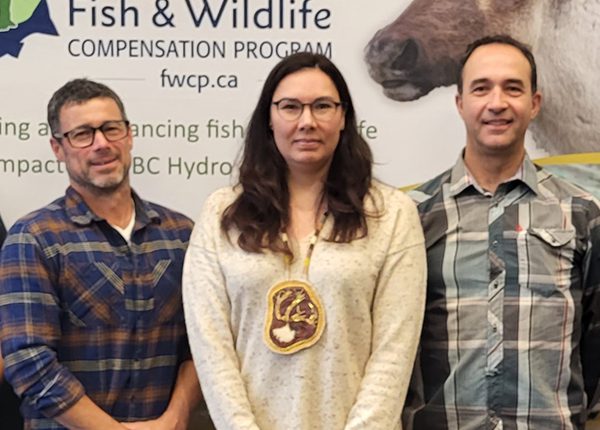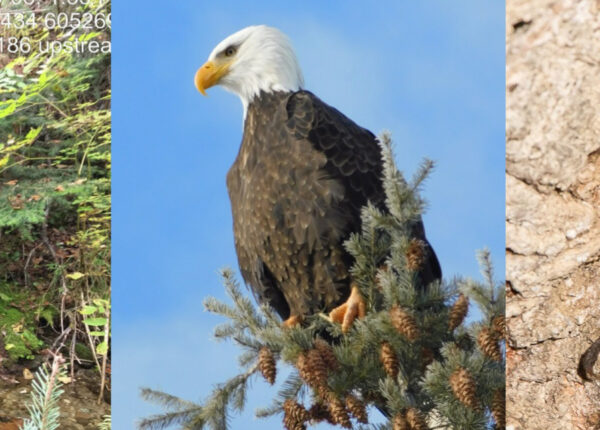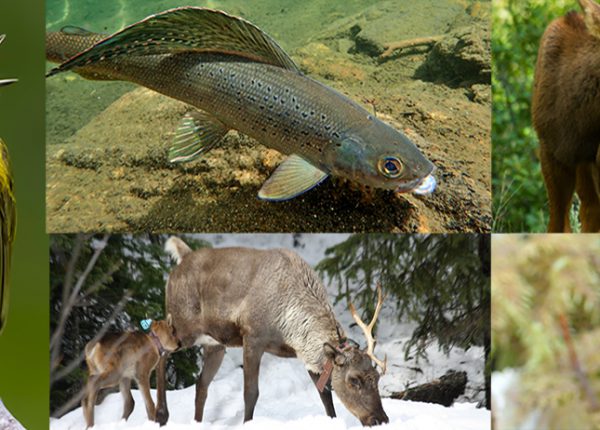Klinse-Za/Scott East Mountain Caribou Population Doubles Since 2014
Maternity pen for calves is successful
The endangered Klinse-Za and Scott East Mountain Caribou herds are getting help from a caribou calf, and six others born this spring near Chetwynd. The seven calves were born in a fenced, six-hectare maternity pen. The calves will stay in the pen until the youngest is about six weeks old and less vulnerable to predators. Keeping the calves safe in their first few weeks helps survival rates, which is good news for the herd.
“In 2013, the size of the combined herds was down to 32 individual caribou. Without help to increase calf survival, the herd could be gone entirely,” says Chelsea Coady, Manager of the Fish & Wildlife Compensation Program’s Peace Region. The Fish & Wildlife Compensation Program (FWCP) has been funding the maternity pen for the last two years as part of its mandate to conserve and enhance fish and wildlife impacted by existing BC Hydro dams.
There are now 61 caribou in this herd, not including the calves born in 2017. Since it was set up in 2014, 35 calves have been born in the pen located west of Chetwynd.
Predators, including bears, wolves, wolverine, and lynx, together with habitat that has been fragmented by human development, and activities such as oil and gas lines, and reservoirs, have contributed to declining herds.
“Calves born in the maternity pen have a higher survival rate than calves in the wild and are helping to maintain the herd’s population,” says Scott McNay of Wildlife Infometrics, which is leading the project in collaboration with West Moberly and Saulteau First Nations.
Nine caribou cows were captured by net-gunning from a helicopter this past March and have been monitored, along with the calves born in the pen, by veterinarians. The safe enclosure is guarded 24-hours a day by shepherds from the West Moberly and Saulteau First Nations. It looks like bears have tried to enter the pen, which is electrified, and the shepherds recently saw evidence of a Grizzly Bear near the pen.
There are plans to continue the pen next year, possibly in a new location, and continue building the herd.
This project is a partnership between Wildlife Infometrics, West Moberly First Nations and Saulteau First Nations, with support and funding from many others including, Teck Coal, West Fraser Mills, Treaty 8 Tribal Association, Canadian Forest Products, BC Ministry of Forests, Lands, and Natural Resource Operations (FLNRO), Spectra Energy (now Enbridge), Anglo American Coal, Walter Energy (now Conuma Coal), BC Hydro, Environment and Climate Change Canada, TransCanada, BC Oil and Gas Research and Innovation Society (BC OGRIS), and the BC Boreal Caribou Research Effectiveness Monitoring Board (REMB), as well as the Fish & Wildlife Compensation Program (FWCP).
The FWCP is a partnership between BC Hydro, the Province of B.C., Fisheries and Oceans Canada, First Nations and Public Stakeholders to conserve and enhance fish and wildlife impacted by existing BC Hydro dams.
“This is one of several caribou projects approved by the FWCP’s Peace Region Board for 2017-2018,” says Coady. “We have approved grants and funding for 26 fish and wildlife projects valued at $2.2 million. Many of them involve local First Nations and all of our projects focus on local conservation priorities.”
Subscribe and receive updates on FWCP projects.





